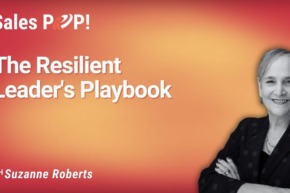In a recent episode of the expert insight interview, host John Golden engages in a profound conversation with Suzanne Jabour, a grief educator and transformation coach. Suzanne, who has experienced the devastating loss of her son, shares her journey of turning grief into a mission to educate others about the complexities of grief and the importance of compassionate leadership in the workplace. This blog post delves into the key themes discussed in the episode, offering actionable advice and thorough explanations to guide listeners and readers alike.
Understanding Grief and Its Impact
The Universality and Misunderstanding of Grief
Suzanne begins by reflecting on her personal experience with grief, emphasizing that it is a universal yet often misunderstood experience. Many people are not equipped to handle grief, either in themselves or in others, due to societal taboos surrounding the topic. This lack of understanding can lead to feelings of isolation for grieving people.
Key Points:
- Grief is Universal: Everyone will experience grief at some point, whether it’s the loss of a loved one, job loss, relationship changes, or even positive transitions that require leaving something behind.
- Misunderstanding and Isolation: Societal taboos and a lack of understanding can make grieving individuals feel isolated and unsupported.
Normalizing Conversations About Grief
Suzanne stresses the importance of recognizing that grief is a normal and healthy response to loss. By normalizing conversations about grief, organizations can create a culture of compassion that allows individuals to feel supported during difficult times.
Actionable Advice:
- Open Dialogue: Encourage open conversations about grief within the organization.
- Education: Provide grief education to employees to foster understanding and empathy.
- Support Systems: Establish support systems such as employee assistance programs or peer support groups.
The Role of Compassionate LeadershipMoving Beyond Sympathy and Empathy
John and Suzanne discuss the critical role of compassionate leadership in addressing grief in the workplace. Suzanne explains that many leaders feel uncomfortable discussing grief and may instinctively withdraw, thinking that giving space is the best approach. However, this can lead to further isolation for the grieving individual.
Key Points:
- Compassionate Leadership**: Compassion goes beyond sympathy and empathy; it involves taking action to help those who are grieving.
- Maintaining Connections**: Leaders should strive to maintain connections and offer support rather than withdrawing.
Practical Ways to Support Grieving Employees
Suzanne emphasizes that simple gestures can significantly alleviate the burden on grieving employees. Leaders can create an environment where individuals feel valued and understood by actively engaging with employees and asking how they can help.
Actionable Advice:
- Flexible Work Hours: Offer flexible work hours to accommodate the grieving process.
- Regular Check-Ins: Schedule regular check-ins to discuss ongoing feelings and needs.
- Personalized Support: Provide personalized support, such as meeting reminders or assistance with workload management.
Creating a Culture of Openness
Acknowledging Emotional Challenges
The conversation shifts to the importance of creating a culture of openness within organizations. Suzanne suggests that leaders should openly acknowledge the emotional challenges that come with loss and restructuring.
Key Points:
- Naming Emotions: By naming emotions and validating the experiences of employees, leaders can foster a sense of safety and belonging.
- Regular Check-Ins: Instead of assuming that a few days off are sufficient for recovery, leaders should schedule follow-up conversations.
Proactive Approach to Employee Well-Being
Suzanne highlights the need for regular check-ins with grieving employees. This proactive approach demonstrates that the organization cares about the well-being of its employees and is committed to supporting them through their grief journey.
Actionable Advice:
- Follow-Up Conversations: Schedule follow-up conversations to discuss ongoing feelings and needs.
- Emotional Support: Provide emotional support through counseling services or peer support groups.
- Training for Leaders: Offer training for leaders on how to handle grief and support grieving employees.
Addressing Grief in Remote Work Environments
Challenges of Virtual Communication
As the discussion progresses, John and Suzanne address the challenges of supporting grieving employees in remote work settings. Suzanne acknowledges that while virtual communication can be effective, it requires a heightened awareness of non-verbal cues.
Key Points:
- Non-Verbal Cues: Leaders must learn to read body language and tone of voice to gauge how employees are feeling, even through a screen.
- Intentional Connections: Be intentional about creating meaningful connections, even in virtual environments.
Fostering Meaningful Connections
Suzanne encourages leaders to be intentional about creating meaningful connections, even in virtual environments. This can involve scheduling regular video calls, checking in on employees’ well-being, and fostering an atmosphere where individuals feel comfortable sharing their experiences.
Actionable Advice:
- Regular Video Calls: Schedule regular video calls to maintain personal connections.
- Well-Being Check-Ins: Regularly check in on employees’ well-being.
- Virtual Support Groups: Create virtual support groups where employees can share their experiences and support each other.
The Path Forward
In conclusion, Suzanne Jabour’s insights on grief education and compassionate leadership provide valuable guidance for organizations seeking to support their employees through various forms of loss. By fostering open conversations about grief, practicing compassion, and creating a culture of understanding, leaders can help individuals navigate their grief journeys while maintaining a sense of connection and belonging in the workplace.
Key Takeaways:
- Normalize Grief: Recognize grief as a normal and healthy response to loss.
- Compassionate Leadership: Move beyond sympathy and empathy to take actionable steps to support grieving employees.
- Culture of Openness: Create a culture of openness by acknowledging emotional challenges and providing regular check-ins.
- Support in Remote Environments: Intentionally create meaningful connections and provide support in remote work settings.
By embracing these principles, organizations can support their employees and cultivate a culture of compassion that benefits everyone involved. This episode is a powerful reminder of the importance of empathy, understanding, and intentionality in leadership, particularly when it comes to supporting grieving people.
Our Host
John is the Amazon bestselling author of Winning the Battle for Sales: Lessons on Closing Every Deal from the World’s Greatest Military Victories and Social Upheaval: How to Win at Social Selling. A globally acknowledged Sales & Marketing thought leader, speaker, and strategist, he has conducted over 1500 video interviews of thought leaders for Sales POP! online sales magazine & YouTube Channel and for audio podcast channels where Sales POP! is rated in the top 2% of most popular shows out of 3,320,580 podcasts globally, ranked by Listen Score. He is CSMO at Pipeliner CRM. In his spare time, John is an avid Martial Artist.







Comments